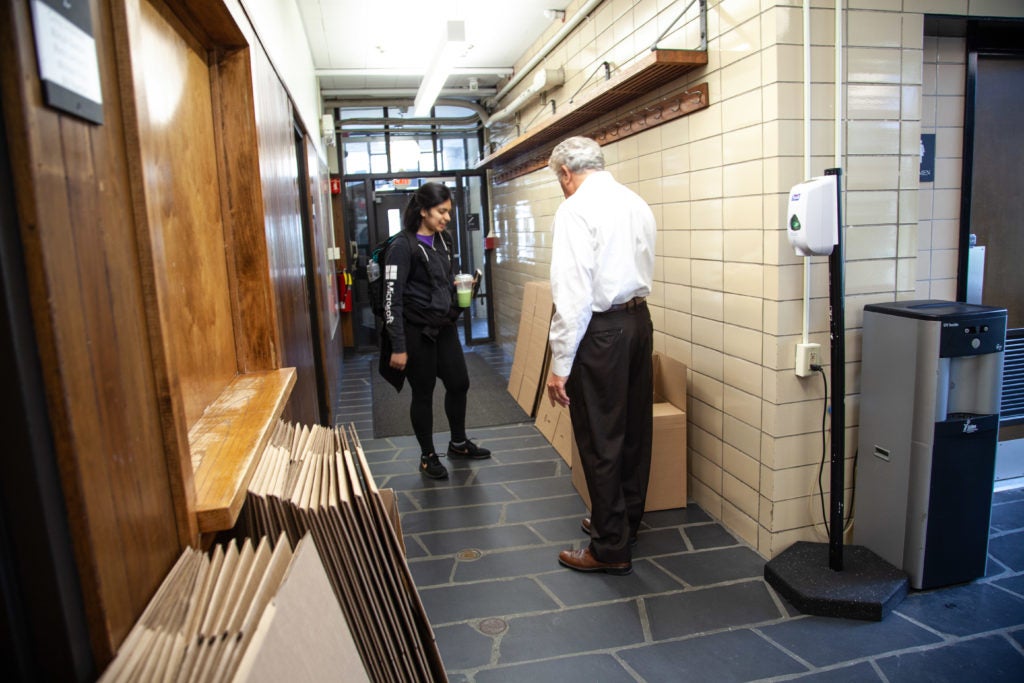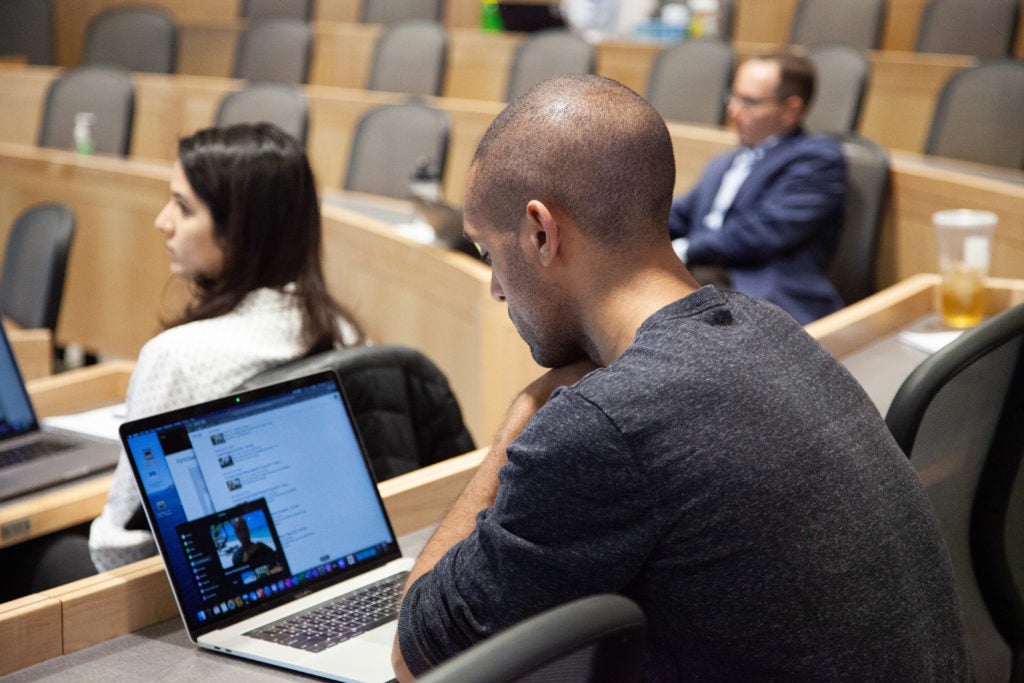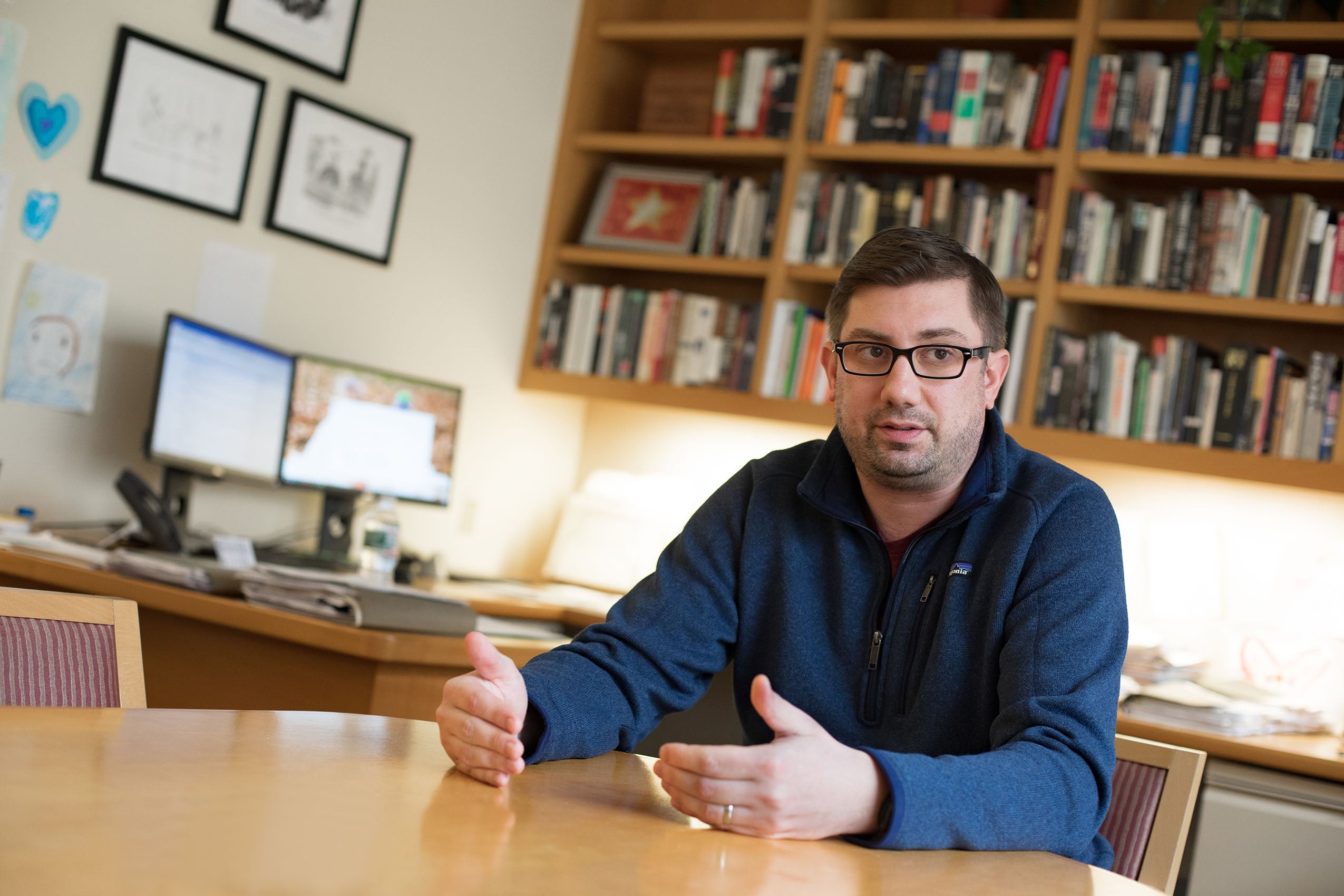Harvard University and Harvard Law School will shift to remote teaching and learning beginning Monday, March 23 as part of efforts to limit the spread of the coronavirus in the community while continuing to educate its students. We sat down with Matt Gruber, Harvard Law School dean for administration, to ask him about why this decision was taken, how it will be carried out, and how it is likely to affect different members of the Harvard Law School community. For the latest updates, please visit the HLS coronavirus information page.
Harvard Law Today: Why has the university taken this unprecedented move?
Matt Gruber: The university decided to make an unprecedented move to deal with unprecedented circumstances. In the 400-year history of the university, the only time we’ve had something even remotely like this was during the Revolutionary War and World War II. It was a difficult decision guided by public health experts, including faculty from across Harvard and our affiliated hospitals.
One of the best ways to mitigate the potential impact of the disease is through social distancing. To the greatest extent possible, you try to eliminate large group gatherings and minimize the number of people coming together in close settings. That is why the University and the Law School moved quickly to reduce the population on our campus. As Dean Manning has made clear, our top priority is to preserve the safety of the community while doing our best to fulfill our mission of teaching and learning. That first principle has guided all of our efforts.
It appeared we may have been more aggressive than others on the front end, but it’s slowly been proven out that the guidance we received—to distance ourselves in a reasonable way—was well founded. Achieving that in an educational space that is highly dependent on personal interaction is a big challenge.

HLT: Students have also been asked to vacate the dorms. Why are they not able to stay?
MG: It would be very difficult to follow the medical guidance about social distancing if most students remained in our dorms. Many of our dorms have shared bathrooms, shared kitchens. The primary objective of social distancing is to try to slow the spread of this disease for two purposes: to give the medical community time to ramp up and not overwhelm them with care needs; and the other, to elongate the time it takes for the virus to spread in order to give the medical community time to do research and develop treatments. Significantly reducing the number of students in our dorms is part of the larger de-densification effort happening across the entire campus.
We recognize that moving people from their current living situation is highly stressful and disruptive, not just to their academic experience, but to their lives. For many folks, this is the place that they call home and we are very much aware of that fact while still trying to do our best to follow the guidance of medical experts.
HLT: What about students who have no place to go?
MG: The first thing I will say is, no student will be left without a place to live. For example, if students in our dorms have come here from countries that are currently considered Level-3 warning countries by the CDC, they will not be asked to return to those countries. They will be given the option to stay. We are reviewing other circumstances as we speak.
HLT: Have any accommodations been put in place to support students?
MG: We were able to, in very short order, put in place a number of processes, policies and approaches—based upon our current financial aid structure—to ensure that we were providing those most in need with the necessary resources. We are covering the cost of reasonable travel expenses for students moving out of the dorms. We are providing funding for shipping expenses. We are providing storage for 1Ls and 2Ls’ belongings in the same way we do in the summer when those classes depart for the year. And we are encouraging students with other emergency assistance needs to reach out to the Dean of Students Office. We have also made all of our Student Services staff available to our students to talk about the challenges around this disruption and to provide guidance and support. [Students: Please visit the HLS coronavirus information page for more information.]
HLT: Full remote learning begins after Spring Break. What kind of supports are being put in place?
MG: The move to remote teaching and learning has been a Herculean effort. We activated our local emergency management team at the law school to begin contingency planning several weeks ago with a number of goals in mind, including preparing for the possibility of needing to deliver the academic program in a remote fashion. Events have moved so quickly that we have faced certain challenges–many of which we’ve overcome and others we continue to work on.
One of the biggest challenges is trying to figure out how best to adapt our academic policies to address this new situation while coordinating and ensuring we are in alignment with the regulatory requirements of legal education.
We gathered a cross-functional team of our Academic Affairs, Registrar’s Office, Faculty Support Services, IT, and Student Services staff, and many others, to think across the myriad challenges that were presented by this change. For example, we have subject matter experts in faculty support services who are highly experienced in the use of Canvas, our learning management system. That allowed the IT staff to focus on technical issues while they worked to address user-based issues.
The response so far has been as positive as you could hope. What I have seen from this community in the last week is what I knew I would see–folks stepping up to try to help one another and try to achieve a singularly difficult but common goal.
HLT: What about students who need accessibility support at this time?
MG: Students who need accessibility accommodations are at the top of our minds during this transition. We have had our accessibility team and the Dean of Students Office on high alert, engaging with individual students. We will ensure that all of our students who need accommodations get them.

HLT: Can you say a few words about the role the faculty is playing?
MG: Our faculty have been extraordinary in this moment. It has reinforced to me the deep relationships that they have with their students. Among the first places that students went when these events unfolded was to our faculty, including 1Ls to their section leaders. I think we are seeing the strength of the bonds in our community.
In these very difficult times, faculty have been very flexible. They have attended on-campus trainings, worked to make adjustments to their courses. Those who have experience with distance learning, whether in their own pedagogy or teaching through our Executive Education Program, have offered to help train their colleagues. They have helped us spot issues, see challenges that we might have missed. As I’ve said, we’ve worked collectively to try to implement something that nobody considered possible.
HLT: How are staff being impacted?
MG: We have just begun the process of transitioning to remote work for staff. We have been preparing for this for several weeks by actively working across multiple departments and developing contingency plans. Thanks to the forward-looking leadership of our IT group, all of our staff now have individual Zoom accounts, which greatly facilitates remote work. As a first step in this process, we have asked staff in roles that allow them to work remotely to begin doing so over the course of next week as they are able. We understand that a number of our staff members will need to be physically on campus next week to support students, help with Zoom and other trainings, and meet other operational needs. But we expect that a large percentage of our staff will be in a position to begin working remotely next week, and for that number to possibly grow beginning the week of March 23.
HLT: How can staff members stay updated?
MG: I would encourage people to go to the Harvard Law School coronavirus information page. We worked with our partners at Harvard University to create a checklist for remote work that should be helpful. Check your equipment, don’t forget to take your power cord home for your laptop, those kinds of things. Everybody has a OneDrive, which is a virtual shared drive. Start moving some documents to that. You may not have access to physical files so if you need anything, scan them, put them on your OneDrive. You’ll have access to them anywhere, including on your mobile phones.
HLT: What are the things that you are focused on now that are harder to sort out than you may have anticipated?
MG: Some of the nuance of going to full remote teaching, such as supporting our clinical work presents some specific challenges. Our clinics are one of the great assets of Harvard Law School. We are one of the largest legal services providers in Eastern Massachusetts. Our clinics have deep commitments to clients and ethical obligations. They represent deeply underserved populations all over the Commonwealth of Massachusetts and beyond. Finding a way for them to work remotely while coordinating with other legal service providers, court systems and clients for example, is one of many considerations to be factored.
HLT: In this stressful time, any suggestions for staying healthy?
MG: The first thing I will suggest is sleep. It’s not always easy to do, but it is very important both for our ability to function and for our immune systems, to be well rested, to eat regularly, to drink enough water—all the basic things that many of us don’t always think about. Try to exercise. Exercise has proven to help us in so many different ways. It’s also really important to talk to one another, be compassionate to one another and be compassionate with ourselves, to recognize that this is an unprecedented circumstance and try to respond accordingly.
HLT: Can you say a few words about how this past week has been for you?
MG: It has been very difficult and also very inspiring all at the same time. Dean Manning’s leadership has been exceptional and the number of people who have stepped up, who have asked, “How can I help? What can I do?” has really cemented what we already knew about the community at Harvard Law School. On a personal level, I have two kids, eight and six. I have my mom who at 72 has some underlying health issues and lives in assisted living and that is no small concern of mine. As the days go on, I am focused on following the direction of medical professionals, doing the job that I was brought here to do, and working with everyone to support them in whatever way I can. While it’s been hard and slightly scary and challenging in many moments, I think overall, we have seen really an inspiring response from the community.
